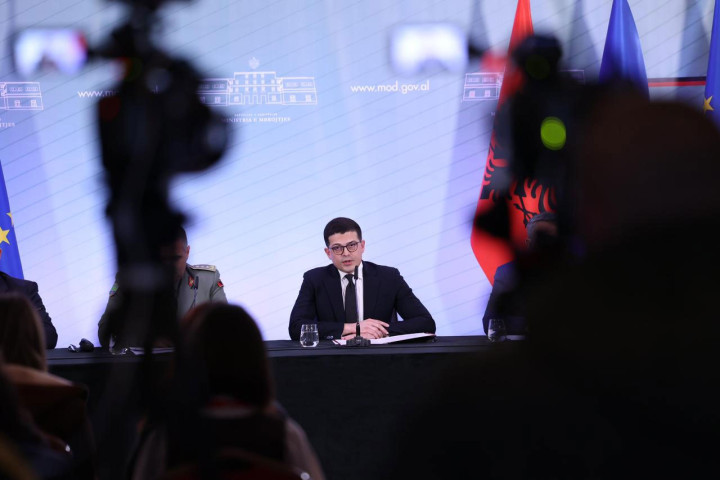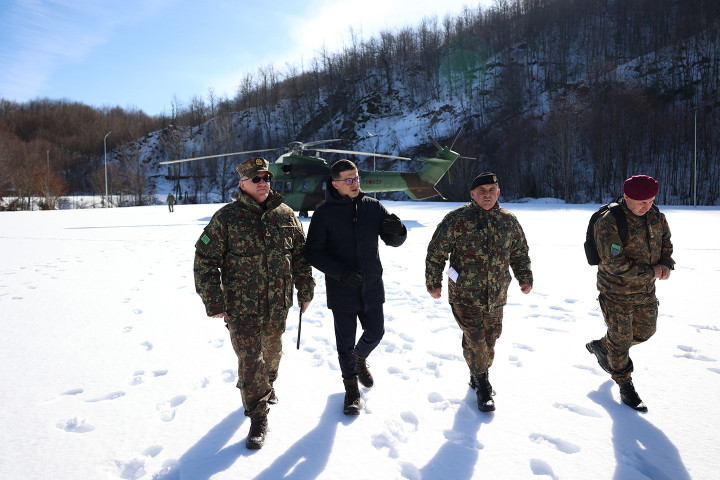Remarks by Mrs. Mimi Kodheli, Defence Minister of Albania at the Defence and Security Committee of the NATO Parliamentary Assembly
-
Published: Sunday, 29 May 2016 14:24
Dear Madam Ameline,
Distinguished Members of the Defence and Security Committee of NATO Parliamentary Assembly,
Distinguished colleague deputies,
Ladies and Gentlemen,
Good morning to you all;
Let me start my intervention by thanking the organizers of this Assembly for inviting me to this meeting of the Defense and Security Committee, under the auspices of the Spring Session of the NATO Parliamentary Assembly. I avail myself of this opportunity to warmly welcome all of you here in Tirana.
Dear Colleagues,
NATO is a community of values, united by democracy, individual freedoms, human rights and the rule of law. Thus, the NATO Parliamentary Assembly composed of you, national Members of Parliaments from all NATO member countries is an evident embodiment of NATO’s democratic values. Therefore, it is my immense pleasure to address this distinguished audience on the threats and challenges, emanating from the current Security Architecture in Europe, while considering the NATO’s role and response, as a consequence.
Dear friends,
Until late 2013, our Alliance was dealing with Crises Management Operations and Cooperative Security activities, by expanding the platforms of the partnerships. NATO was in a vivid internal discussion about its transformation, after the ISAF mission was coming to an end. Meanwhile, in accordance with the Lisbon Summit Declaration, which recognized the NATO’s strategic partnership with Russia, NATO enhanced the cooperation with the Russian Federation, including the missile defense domain. All of the above are some brief and factual events conducted by NATO, to safeguard peace, stability and prosperity in the Euro-Atlantic Area and beyond. Many of us envisioned an expeditionary NATO, with no threats to our direct borders and capable of enjoying a military supremacy in every aspect towards those considered as enemies of the time.
Regretfully, almost two years ago, all of us watched the illegal annexation of Crimea by Russia and their continuous coercive activities in and around Ukraine. In addition, Russia began to increase the rhetoric against NATO and its Allies, even in a very dangerous and disturbing domain, that of “nuclear”. Let me recall the statement of the Russian Ambassador to Denmark in March 2015, who asserted that if Denmark joined a U.S.-led missile defense system, Danish warships would become targets for Russian nuclear missiles. The list of similar statements and “unjustified maneuvers” by Russian land, air, maritime and strategic assets in the Baltics, Black Sea, East Mediterranean and North Atlantic is rather quite long and, in our view, is pulled deliberately together.
On the other hand, the “Arab Spring” turned into an “Arab Winter”. The devil found fertile terrain, appeared and grew up with extreme violence. The “so-called Islamic State”/Daesh and other terrorist groups, fed by the worldwide Foreign Fighters phenomenon, are a real threat not only to Middle East and North Africa, but to our societies, as well. And the tragic events in Ankara, Paris, Brussels and elsewhere are a clear message to that end. Furthermore, the failing and non-functioning of states intertwined with the violence in the Middle East and North Africa has triggered biblical suffering and a massive flow of refugees to our own homes or immediate neighboring countries.
In a nutshell, this is the “resume” of the security environment in Europe: a combination of traditional and non-traditional threats and challenges, provoked by state and non-state actors, which would require a broad and firm approach to deterrence and defense. However, prior to these events and for a long-time, the defense was “put aside” and the defense spending over years decreased significantly. That is why shifting from a “crises management mode” to a “collective defense one”, for many countries was not easy, in particular when it came to “re-investing for defense”.
It is obvious that in times we live in, the migration and terrorism are on top of the transnational challenges that require transnational solutions. And in such scenarios, we seek NATO and EU-level responses. It is not an easy task to deal with these multi-dimensional challenges, but there is no middle way. The failure of not managing the above-mentioned challenges, will mean a fragmentation of the unity in the European Continent. And unfortunately, there are many waiting for that to happen.
Furthermore, with these new conflicts, we must not forget the regions that can easily be affected by the international turmoil, due to their instability and vulnerability. Western Balkans is one of them, relatively far from Russia and the Middle East, but largely influenced by the money and ideology of Moscow and fundamentalism. This region is the crossroad where the East and the South meet and the today’s threats and challenges are present.
And in our view, in times of such conflicts, other possible conflicts can be easily prevented by integration processes. Integration spreads stability and security, and provides a key incentive to aspiring countries to undertake democratic reforms. With regard to NATO and the EU, the countries of our region have different paths, objectives and agendas but yet, many of them are still fragile on their way of building liberal democracies. We all know that the way towards EU membership is more complex for Western Balkan, and so it is for my own country. Political and security uncertainties, as well as economic restrictions are weakening the dream of integration.
That is why Albania strongly supported the Montenegro’s path towards NATO and we applaud the signature of the Accession Protocol by the NATO Foreign Minister’s few days ago. It was a sign that NATO presence in the Western Balkans is highly welcomed and appreciated. Montenegro will not be the last country to join the Alliance, as long as the Article 10 of Washington Treaty is concerned and as national decisions and choices on integration aspirations are made freely. We, in Albania, are firm believer of the unique and irreplaceable role of the Alliance, therefore each country of our region is encouraged to assess and explore the immense opportunities that only the relationship with NATO can offer.
My country will support additional increased presence of NATO in the South East Europe, because for us it will simply mean that the community of shared values and principles is growing. Inclusiveness is a must, therefore we should approach constructively all the countries of the region. We are of the opinion that the time has come for NATO to open a new page of structured dialogue and partnership with Kosovo.
I may go on with integration related discourse, because the Albanians still believe in the “European project” and in my view this is one of the “key weapons “to repeal the troubles from our vicinities. Nevertheless, I want to make another key point, in the way to address the security challenges. And that is Building a Common-Understanding and Standing Together in front of our adversaries and challengers.
We do not seem to agree on the precise nature of the challenges, their implications for our continent and least of all, how to address them. In some cases, the differences of views and attention may be drawn between regions or nation-states as a matter of geography. I know that things are not just black and white and that the challenges and threats are felt differently across Europe. So, I do believe that we need to focus on what brings us together and unites us: our common values. The transatlantic bond must be advanced and preserved.
At the Wales Summit we took important decisions to reassure our Eastern Allies, to remain committed to strengthening NATO’s collective defense and to increase defense spending. The implementation of NATO’s Readiness Action Plan is a crucial part of this. We need to invest, and we need to build our capabilities. This year, Albania stopped the 7-year decreasing trend on the defense expenditure. The 2016 defense budget has a 12% increase in real terms, compared with 2015 and this is a signal that Albania stands to the decisions taken at Wales, regarding the Defense Investment Pledge.
In the meantime, we have been consistent with our contributions and engagements, in support of NATO’s three Core Tasks. This year we will increase the level of participation in Resolute Support Mission, Afghanistan, while in Kosovo we will maintain the current levels, in accordance with the NATO End State Deterrent Presence. When it comes to Readiness Action Plan implementation package, Albania is contributing to the enhanced NATO Response Force/Very High Readiness Joint Task Force with an infantry company for the period 2016-2018. Likewise, it is worth underscoring the high level Albanian manning of NATO Command and Force Structure, the officers already and/or about to serve at the new structures of NATO Force Integration Units and Multinational Division South-East in Romania and Bulgaria.
We are in the process of exploring and sorting out the legal base to support the efforts of the anti-ISIL coalition on the ground and closely looking for involvement in the NATO maritime operation in the Aegean Sea, to assist in the migration crises. In EU context, since November 2015, we have sent an EOD team in Mali and are contributing with staff officer in ALTHEA, Bosnia-Herzegovina. It is of outmost importance to note the Albanian assistance to project stability beyond NATO’s borders. Our personnel is advising and assisting several partner nations, such as Georgia, Ukraine etc, to build their own defense capacity and resilience.
Lastly, as you might be aware, we are very much concerned regarding the Foreign Fighters feeding the terrorist organizations in the Middle East and North Africa. Thus, after the discussions and coordination at bilateral and NATO level, we are now in the phase of accelerating our efforts to establish a NATO Foreign Fighters Center of Excellence in Albania against this phenomenon.
This spectrum of contributions is a clear indication of the Albanian commitments and readiness to bolster common security and contribute to the overall Long-Term Adaptation efforts of NATO, towards the Warsaw Summit. This is our obligation and we will preserve and cherish the founding principles of our Bond.
Dear participants,
I would like to conclude my speech by expressing my sincere thanks and special attention to your work. We don’t only appreciate but we also pay a great attention on your deliberations and recommendations. We do welcome the NATO Parliamentary Assembly’s crucial role, in providing greater transparency of Alliance policies and fostering a better understanding of NATO’s objectives and mission, among legislators and the citizens of the Allied Countries.
Thank You for your kind attention!
Articles from Newsroom
Monday, 26 January 2026



Defence Minister Vengu hosts Belgian counterpart: Cooperation to strengthen our capabilities
Tuesday, 20 January 2026
Albanian Air force trains with the U.S. Air Force, focusing on rapid crisis response
Monday, 19 January 2026